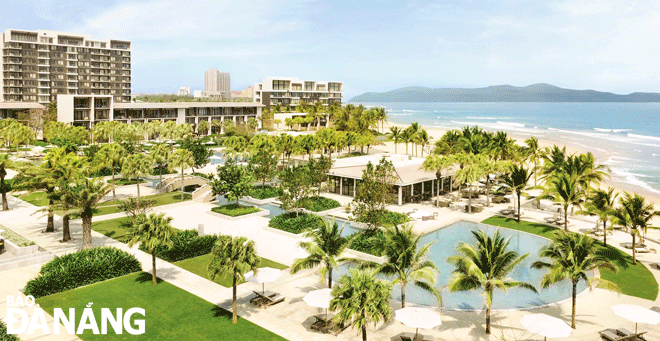Da Nang eyes measures to promote water reuse
Along with limiting the exploitation of underground water sources, many Da Nang-based businesses are encouraged by the Da Nang administratio to promote the reuse of treated wastewater meeting the standards. In addition, they are promoting many water reuse initiatives to approach the circular economy.
 |
| Some coastal resorts, including Hyatt Regency Da Nang Resort in Ngu Hanh Son District have invested in wastewater treatment systems to reuse water for watering plants and grass. Photo: DNO |
At resorts, the volume of wastewater generated from daily activities of tourists is very large, mainly from bathing, washing, water discharge from swimming pools. The wastewater is treated at in-resort standard wastewater treatment systems and then is discharged into the city's wastewater collection system to make its way to the city’s centralised treatment stations before being discharged into the environment.
Resorts have to pay fees for the exploitation of groundwater for irrigation activities so they want to reuse the treated water. In addition, many businesses that use a lot of water for production also want to reuse treated wastewater to water plants, wash the ground, cool the roof of the factory in the dry season to combat the heat.
Water reuse (also commonly known as water recycling or water reclamation) reclaims water from a variety of sources then treats and reuses it for beneficial purposes such as agriculture and irrigation, potable water supplies, groundwater replenishment, industrial processes, and environmental restoration.
Ms. Dang Nguyen Thuc Anh, Deputy Head of Minerals and Water Resources Division of the Da Nang Department of Natural Resources and the Environment) said, in resorts, it is not appropriate to use tap water for watering plants because its cost is 10 times higher than compared to groundwater extraction.
Therefore, most businesses choose the solution of exploiting groundwater for watering plants. Over the years, the city has encouraged businesses to upgrade the wastewater treatment system to ensure that the quality of the treated water can meet the regulations for watering plants.
There are many coastal resorts in support of this policy and implementing it very well, of which seven have upgraded their wastewater treatment systems. However, according to the enterprises, if you want to upgrade the wastewater treatment system to reuse water for irrigation purposes, you must change the environmental impact assessment report, invest in more biological filter tanks to handle it again and need someone with professional qualifications in operating wastewater treatment.
“In the time to come, when tourism is fully restored, businesses will have more favourable conditions to upgrade wastewater treatment systems at resorts to reuse the treated water for irrigation purposes, gradually replacing underground water exploitation”, said Ms. Anh.
Currently, within the framework of the ongoing ‘Join hands to protect water resources’ project funded by the United States Agency for International Development (USAID), the Centre for Environment and Community Research (CECR), the Viet Nam Water Conservation Network (VIWACON), the Ha Noi and Da Nang universities of Science and Technology are jointly deploying research into promoting water reuse initiatives in businesses to access circular economy.
The aforementioned units have conducted surveys at 25 resorts and hotels; 26 manufacturing and processing factories in the city. It was found that many businesses have had measures to save water, operated wastewater treatment systems that meet regulations, but reuse water activities has not been paid much attention and has not been implemented effectively.
Only coastal resorts, 5-star hotels with large space, a system of flower gardens and many ornamental plants have showed their interest in this matter.
Ph.D. Nguyen Dinh Huan, the Dean of the Faculty of Environment at the Da Nang University of Science and Technology proposed that the local authorities need to ask businesses to have solutions to save and reuse water.
“The reuse of water will help businesses get economic benefits such as paying less monthly water bills, paying less for wastewater treatment and joining hands to protect the environment, contribute to relieve the pressure of water shortage for the city. What needs to be done is to demonstrate the water reuse model to businesses for better implementation. Besides, it is necessary to guide a number of large enterprises to build systems to collect rain water from the roof of the factory and for storage and later usage”, said Huan.
In order to promote water reuse in businesses, Deputy Director of the Department of Natural Resources and Environment Vo Nguyen Chuong said that he has directed the Environmental Protection Sub-Department to propose solutions to reuse water in projects when appraising and approving their environmental dossiers, and put the criteria on water reuse in enterprises into the rules of the annual municipal environmental awards.
Reporting by HOANG HIEP – Translating by A.THU